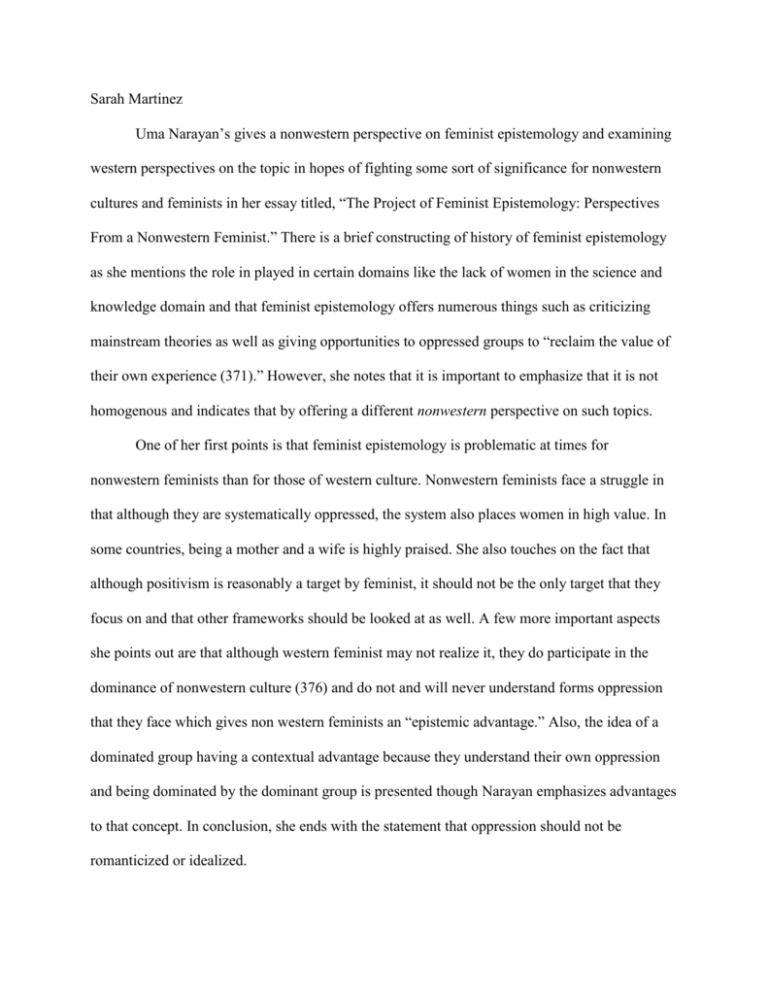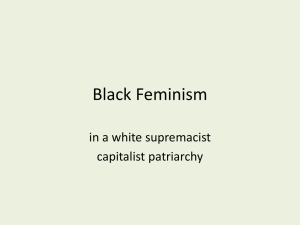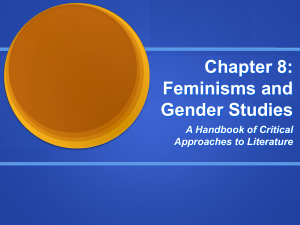Sarah Martinez Uma Narayan`s gives a nonwestern perspective on
advertisement

Sarah Martinez Uma Narayan’s gives a nonwestern perspective on feminist epistemology and examining western perspectives on the topic in hopes of fighting some sort of significance for nonwestern cultures and feminists in her essay titled, “The Project of Feminist Epistemology: Perspectives From a Nonwestern Feminist.” There is a brief constructing of history of feminist epistemology as she mentions the role in played in certain domains like the lack of women in the science and knowledge domain and that feminist epistemology offers numerous things such as criticizing mainstream theories as well as giving opportunities to oppressed groups to “reclaim the value of their own experience (371).” However, she notes that it is important to emphasize that it is not homogenous and indicates that by offering a different nonwestern perspective on such topics. One of her first points is that feminist epistemology is problematic at times for nonwestern feminists than for those of western culture. Nonwestern feminists face a struggle in that although they are systematically oppressed, the system also places women in high value. In some countries, being a mother and a wife is highly praised. She also touches on the fact that although positivism is reasonably a target by feminist, it should not be the only target that they focus on and that other frameworks should be looked at as well. A few more important aspects she points out are that although western feminist may not realize it, they do participate in the dominance of nonwestern culture (376) and do not and will never understand forms oppression that they face which gives non western feminists an “epistemic advantage.” Also, the idea of a dominated group having a contextual advantage because they understand their own oppression and being dominated by the dominant group is presented though Narayan emphasizes advantages to that concept. In conclusion, she ends with the statement that oppression should not be romanticized or idealized. I was particularly interested in reading Narayan’s essay because after reading numerous pieces from nonwestern perspectives in the course, it sparked a new interest in me on that perspective. I thought that the author made some really nice points and overall, I found myself agreeing with her on a lot of them. The way that she painted differences between Nonwestern and Western feminism was clearly defined and using her own culture as an example aided in supporting her argument. One thing I specifically liked was the fact that she mentioned that in nonwestern cultures, there is a struggle in that that these feminists have to work and work against the traditional system in which oppresses them but also gives value to them (372). A lot of western feminists tend to diminish the role of a housewife or mother in that these women are succumbing to patriarchy but they are not considering in other cultures that being a wife or a mother comes with high value and status. This only illustrates that western feminism needs to make a valiant effort in understanding other’s oppression especially in third world feminism. Not to mention, the fact that Western feminists tend to ‘over-power’ diminishes the voices of nonwestern feminists. Like Obioma Nnaemeka illustrated, the west holds a sort of “feminist arrogance” in that other types of oppression that women in other cultures face seems irrelevant to western feminists (318). Another aspect that jumped out at me is the concept of “epistemic privilege” in which the oppressed group have certain experiences that other groups may not. I thought it was really interesting the way she offered the concept in the justification of keeping such experiences that nonwestern groups face to themselves (376). I am kind of torn with this concept in that I do not understand why a group would not want to share experiences to other groups that could help them in terms of fighting against oppression. I thought it was ridiculous but as I read on and she gave her reason, I actually took a step back and realized that it could be justified. Nnaemeka illustrated in her essay “western feminists take over without taking on the color of their environment” (320) which coincides with Narayan’s argument for nonwestern feminists in the reasoning of keeping knowledge and experiences to themselves. Western feminists cannot take over if they cannot understand and they possibly cannot understand experiences of oppressed groups that they have not experienced. Again, I am still a bit on the fence as I am reminded of the phrase “knowledge is power” but the fact that nonwestern feminists have their experiences for themselves could help them finally rise up next to western feminism. Overall, I think Narayan did a great job in illustrating the point that she was trying to get across. Oppression is something that only people who experience can understand even if knowledge is passed on through literature, word of mouth, or art. Those experiences are always unique to that person or to that group. However, even though there is seemingly a picture painted of “western feminists vs. nonwestern feminists,” it is important to note that as much differences as they do draw from one another, they do have something in common: they share the same experiences of being oppressed as women. Although it is important to fight against all oppression, hopefully finding that common ground could help them unite in fighting all sorts of oppression together. Works Cited Narayan, Uma “The Project of Feminist Epistemology: Perspectives from a Nonwestern Feminist.” Feminist Theory Reader: Local and Global Perspectives. Ed. Carole R. McCann & Seung-kyung Kim. New York: Routledge, 2013. 370-378. Print. Nnaemeka, Obioma. “Forward: Locating Feminisms/Feminists” Feminist Theory Reader: Local and Global Perspectives. Ed. Carole R. McCann & Seung-kyung Kim. New York: Routledge, 2013. 317-320. Print.







